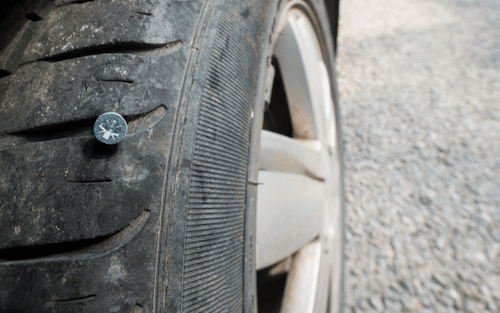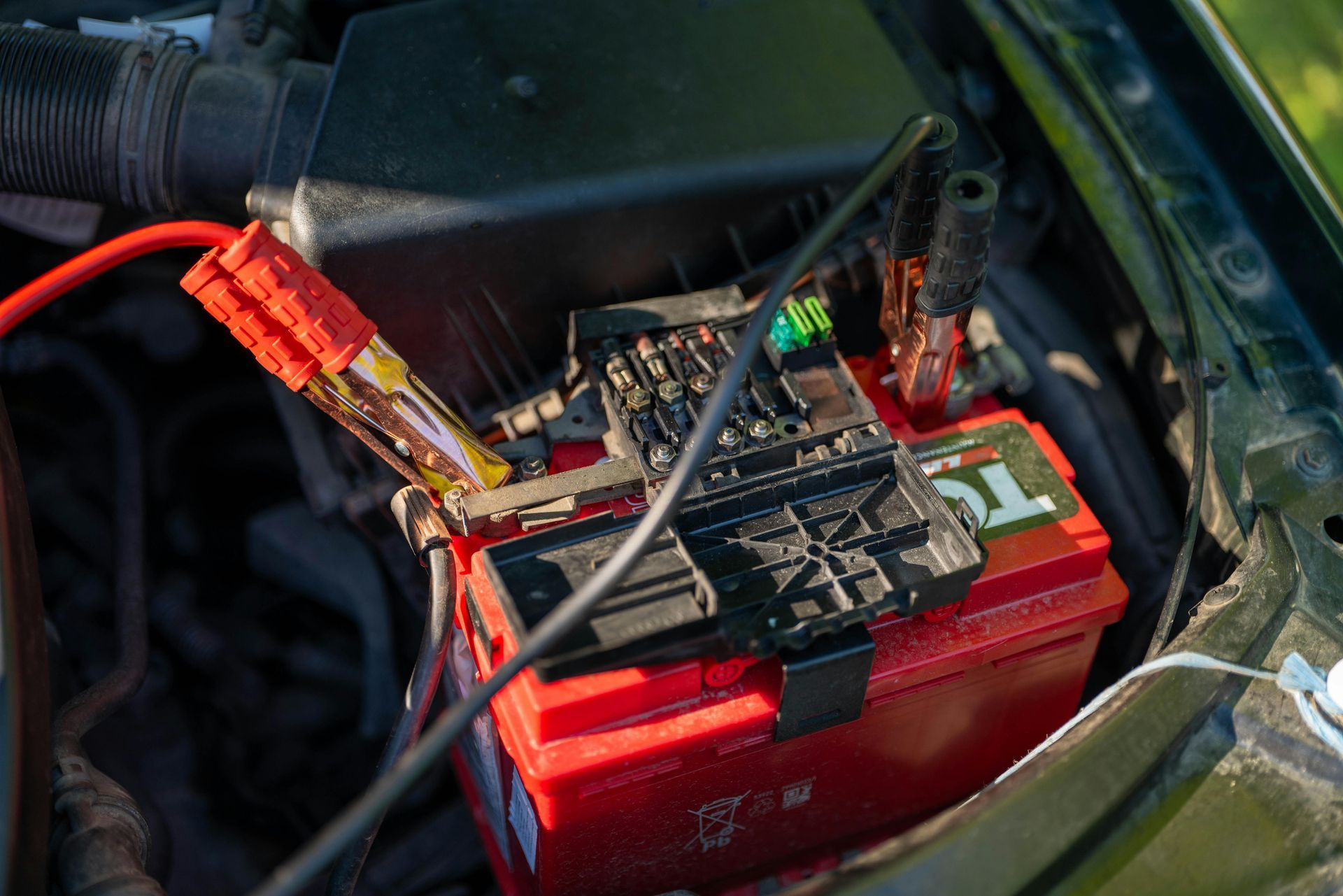Tire Help: What To Do When There is a Nail in Your Tire
Auto Shops Located in: Chapel Hill, Durham, Taleigh, Apex, and Cary North Carolina

We have all been there—you notice a tire looking flat when you find a small nail or screw embedded in the rubber. So why do nails consistently puncture tires? How can you tell when your tire has a leak, and what should you do about it? The automotive mechanics at Chapel Hill Tire are here to answer all of your questions about tire patching and flat repairs.
How Do Nails and Screws End Up In Tires?
One common question we get from customers is, “How do screws puncture tires?” Whether from roadside construction or tool-filled trucks, nails and screws end up on the road far too often. What confuses drivers most is how they end up in tires. You might think your tire would roll over nails and screws on the road—so why is this such a common problem? There are a few reasons why tires and nails so often clash on the road:
- Road shoulders: Nails and other hazards often live on the shoulders of the roads. If you pull over or veer off course for even a moment, your tire is likely to find a hazard waiting. Additionally, nails on the bumpy shoulder of a road do not lay very flat, making it easier to penetrate your tire.
- Tires kicking up nails: Nails can find your front tires after being kicked up by a vehicle in front of you. Driving with a little extra distance between cars can help keep your vehicle protected from these kinds of hazards. Meanwhile, nails can easily find your back tires after being kicked up by your front tires.
- Driveways and side streets: Nails can be surprisingly common in driveways—especially when visiting a home that was recently renovated. Your tires might also be more prone to obstructions if you live in an area with lots of construction.
How Can You Tell If Your Tire Has a Screw or Nail Puncture?
When you begin experiencing tire issues, it can be hard to pinpoint the source of the problem—especially if you are not a professional mechanic. You might find yourself wondering, “Does my tire have a nail in it, or is it something worse?” Here are some clear indicators that you have a nail or screw in your tire:
- Persistent low tire pressure: The most obvious indication of a punctured tire is persistent low tire pressure. Low tire pressure is common as your tires naturally lose air over time. This is especially true in the winter months when the air inside your tires compresses. However, if you fill your tire with air and find that the low tire pressure light quickly returns—you likely have a puncture in your tire.
- Visual inspection: It is a good idea to give your tires a quick look over every once in a while. Regular visual checks can help you spot uneven tire wear, low tire tread depth, low tire pressure, and tire obstructions. Finding these issues early can help you avoid safety hazards on the road and larger vehicle repairs. Keep an eye out for low tire pressure and tire punctures when giving your tires a routine visual inspection.
- Professional insight: Your mechanics often pay careful attention to your vehicle when completing routine maintenance. Experience combined with attention to detail makes it easy for them to spot issues right away—such as tire punctures.
- The soap test: So you think you have a nail in your tire—how can you confirm your suspicions? Spray the tire in question with a healthy amount of soapy water. As the nail lets air out of your tire, it will begin creating bubbles in the mixture.
What Should You Do When You Have a Nail In Your Tire?
The low tire pressure created by tire punctures can lead to tire damage, low gas mileage, bent rims, and dangerous vehicle handling troubles. Additionally, you may fail your car inspection if your tires are not in tip-top shape. So what can you do when you have a nail in your tire? There are a few possible solutions you can turn to:
Professional Tire Patching Service
The best possible solution is to bring your vehicle to an expert for patching service. A professional can quickly find the puncture, remove the nail/screw, patch your tire, and refill your tire with air. This service provides a reliable repair without any of the hassles or risks associated with the alternative solutions. How much does professional tire patching cost? At Chapel Hill Tire, our local tire patching flat repair services are just $25.
DIY Tire Patching
Some drivers attempt DIY patching, but this is not the best solution for most drivers. Many of these patch kits can cost as much as professional service, and it can be easy to damage the tire while attempting a patch. Not to mention, the patching process can be physically challenging and it often completely empties the air out of your tire—leaving drivers with a tire too flat to bring in for a refill. If you end up having to tow your vehicle, you will find yourself facing a much larger bottom line than the money you saved on a tire patch kit.
Fix-a-Flat
Pressurized tire patches like Fix-a-Flat and other synthetic solutions can fix tire punctures from nails, but they come with their own set of risks and considerations. Most severely, they have been linked to risks of tire pressure monitoring sensor damage. Additionally, the sealant can create trouble when you need future tire services, which could result in premature tire replacement and extra labor costs. Much like tire patches, these solutions often cost just as much as professional tire patching, so you can save some trouble and money by turning to the experts.
Chapel Hill Tire Local Patching and Flat Repair Services
When you find a nail in your tire, the experts at Chapel Hill Tire are here to help! Our local mechanics have the tools and experience needed to get your tire fixed in no time. Best of all, we offer coupons, deals, and special discounts for our customers. With our everyday low and transparent prices, you can get affordable, high-quality tire flat repairs without any surprises. Chapel Hill Tire proudly serves the greater Triangle area with our 9 locations across Raleigh, Durham, Apex, Carrboro, and Chapel Hill. You can make your appointment here online or give us a call to get started today!















